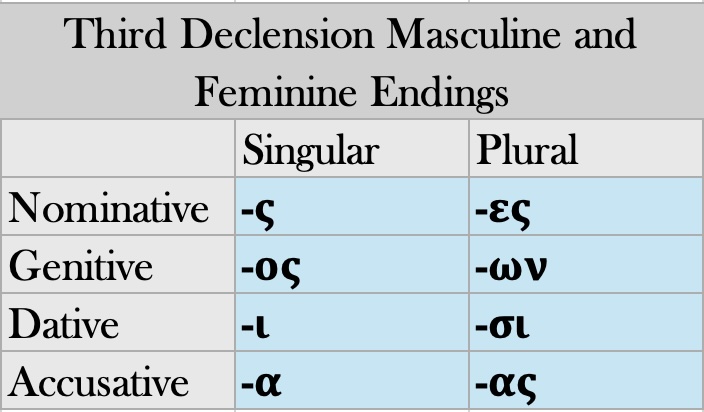7.11 The process of writing or saying all the INFLECTED forms, with the appropriate case endings, of a noun is called DECLINING a noun. This is because ancient scholars metaphorically described noun forms as “declining” down from their nominative singular form. The other cases – Genitive, Dative, and Accusative – are sometimes referred to as OBLIQUE CASES, to distinguish them from this nominative singular form.
Almost all Greek nouns belong to one of three INFLECTION patterns, called the FIRST DECLENSION, SECOND DECLENSION, and THIRD DECLENSION. Each represents a particular set of case endings for gender, number, and case.
7.12 The nouns of this lesson belong to the THIRD DECLENSION and are all MASCULINE in gender. These nouns add the following suffixes to their stem to indicate number and case. (Note: the α of the accusative singular and plural is short).
The Trouble with Sigma
7.13 Notice that two of the case endings involve adding a sigma to the stem: nominative singular = –ς, dative plural = –σι. The set of nouns we are discussing have stems ending in a DENTAL STOP consonant. At this moment, it would be good to review some alphabet math so that we can see what pronunciation – and therefore spelling – changes arise.
Recall that when a σ follows a dental stop consonant, the dental disappears and the σ remains: e.g., δ + σ = σ. A similar process often occurs when a σ follows a –ν, only sometimes (usually in the nominative singular) it is the σ that disappears: ν + σ = ν. In such instances, we often (though not always!) see the process of COMPENSATORY LENGTHENING, where a Greek vowel lengthens to "make up" for the loss of a consonant that follows. Note, however, that only a short vowel can be lengthened; if the vowel is already long or a diphthong, it cannot be lengthened further.
With this alphabet math in mind, take careful note of the ways that the trouble with sigma affects the spelling of our three nouns:
(S 259)
- Read more
-
Spell it Like It Sounds!
Remember: A word ending in –σι can add a final –ν (MOVABLE NU) to ease pronunciation: e.g., εἴκοσί εἰσι → εἴκοσίν εἰσι. For the noun παῖς, for example, this means the dative plural form παισί can appear as παισίν. It does not affect the parsing, meaning, or translation.
Noun Vocabulary
7.17 The vocabulary entry for Greek nouns always comprises three words: e.g., ἄρχων, ἄρχοντος, ὁ. These three words represent the following:
- The NOMINATIVE SINGULAR, so you can see exactly how this form appears. This is particularly helpful if the nominative singular has been changed in response to a sigma, e.g., (ἀρχοντς→ ) ἄρχων.
- The GENITIVE SINGULAR, so you can identify the NOUN STEM, which can be found by dropping the ending –ος, e.g., ἀρχοντ-.
- The DEFINITE ARTICLE, which signals the gender of the noun. The article ὁ indicates that a noun is masculine. The definite article is discussed below.
It is important, therefore, that all three words be memorized as the vocabulary entry for any given Greek noun.






